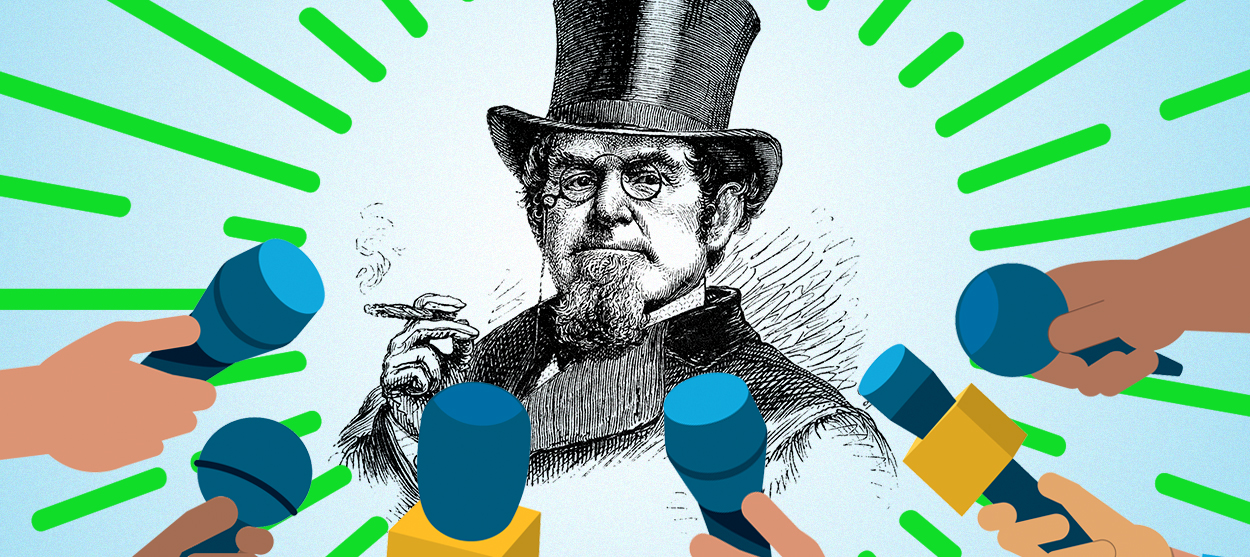Billionaires have opinions. But why do we care?
The views of the mega-rich aren't inherently more valuable or newsworthy than those of working-class Americans


A free daily email with the biggest news stories of the day – and the best features from TheWeek.com
You are now subscribed
Your newsletter sign-up was successful
The news that Michael Bloomberg has filed paperwork to enter the race for the Democratic nomination for president probably shouldn't come as much of a surprise. For nearly 20 years, a fawning media has often tossed out Bloomberg's name as someone who should vie for the White House, strangely convinced that who Americans really want to elect is a socially-moderate, fiscally-conservative New York billionaire.
Bloomberg himself has often entertained the notion. By one estimate, he's considered running at least five separate times over the years. In 2016, Bloomberg toyed for a minute with getting into the race as an independent candidate before deciding against it. (He has switched parties multiple times through the years, bouncing his registration from Democratic to Republican to independent and back again, seemingly only for personal gain rather than out of political conviction. Sound familiar?) Even this year, Bloomberg has been in a will-he, won't-he dance for months now.
It's still not clear if he will. Bloomberg has only registered for the Democratic primary in two states so far. But if he does run, the media titan says he'll self-finance the whole thing. What's $500 million to win the presidency when you are worth more than $52 billion, after all?
The Week
Escape your echo chamber. Get the facts behind the news, plus analysis from multiple perspectives.

Sign up for The Week's Free Newsletters
From our morning news briefing to a weekly Good News Newsletter, get the best of The Week delivered directly to your inbox.
From our morning news briefing to a weekly Good News Newsletter, get the best of The Week delivered directly to your inbox.
Reportedly, Bloomberg's motivation to seek the Oval Office owes to his sense that moderate Joe Biden won't win the nomination and his fear that two left-wing candidates, Elizabeth Warren and Bernie Sanders, look most likely to emerge victorious.
Publicly, Bloomberg has couched his possible entry in his concern for ensuring Trump is defeated, although that hasn't moved him to pour millions into backing Biden, who polls still show as mostly likely to beat Trump. The reality may be that Bloomberg and his billionaire chums, like Amazon's Jeff Bezos (net worth $110 billion) who urged the former New York City mayor to run, are even more worried about what a president Warren or Sanders would mean for their tax bracket.
Bloomberg's candidacy likely won't get far. But the media's frothing over his possible campaign is particularly revealing. On MSNBC's Morning Joe, Willie Geist remarked that "nothing would make President Trump more angry" than all the news coverage that would note the $50 billion difference (or more) between their two fortunes, the sort of talk more suited for gossipy Upper East Side dinner parties than a news show pretending to offer insightful political analysis.
This country club commentary about Bloomberg takes place in a larger media context that grossly over-represents billionaires in the news cycle and allows them to over-influence political coverage. For weeks now, media outlets have churned out detailed investigations of how Sanders' or Warren's tax plan will impact a handful of billionaires. Mark Cuban, Bill Gates, and Leon Cooperman, to name a few, have enjoyed plenty of opportunity to voice their protestations. On CNBC, Cooperman (net worth $3.2 billion) blasted Warren as "disgraceful" before firing off a round of expletives at the senator.
A free daily email with the biggest news stories of the day – and the best features from TheWeek.com
In a different moment, we might imagine such commentary from the fat cats as unsolicited, if not outright condemned. But given how repeatedly reporters have scurried to get their reactions — just Google "billionaires" right now and marvel at all the news coverage they are getting — we're awash in a political reality that is being overdetermined, if not outright remade, by billionaires' perspectives. "Who better to ask," Leslie Stahl said before her extensive interview of JP Morgan Chase chairman and CEO Jamie Dimon (net worth $1.6 billion) on 60 Minutes the other night.
Perhaps just about anyone else.
That's not likely considering how cozy many of the New York media elite are with the captains of finance and industry. But given that Trump's most consequential legislative achievement has been his controversial tax plan that further lined the pockets of the wealthy while hurting the middle class — a result that even Mike Bloomberg's media company has acknowledged – they might at least ask different questions of billionaires than how Sanders or Warren's tax proposals will dent their massive fortunes.
Surely Bezos or Cuban or Lloyd Blankfein (net worth $1.1 billion) might be confronted on whether their outrage over a possible "wealth tax" should be better directed against a president who is shredding the Constitution and undermining the basic system of American democracy that helped make their great wealth possible? In any event, it's remarkable that a potential Warren presidency rather than the actual Trump atrocity has made so many billionaires finally speak out.
Most Americans probably won't worry too much over what a Warren presidency will cost the billionaire class. Still, it's telling that most of the billionaires haven't taken the time to actually figure it out for themselves either. In a recent sit down with the New York Times' Andrew Ross Sorkin — the same man who gave us the Showtime drama Billions, no less — Gates offered that he was happy to pay more taxes, but drew a limit. "You know, when you say I should pay $100 billion," Gates said to Ross Sorkin, "O.K., then I'm starting to do a little math about what I have left over. Sorry, I'm just kidding."
Gates hasn't done the math because he doesn't need to. Those who have estimate that Gates would only pay about $6 billion in the first year under Warren, leaving him with more than $100 billion in his coffers. That he's more ready with a bad joke than with real knowledge about what a Warren tax plan would cost him demonstrates exactly how seriously any of this should be taken. Middle-class Americans, of course, don't have the same luxury to not crunch the numbers when it comes to evaluating their political choices, nor can they be as blasé about how any tax policy would affect their wallets.
We could stand to hear far more from those Americans.
Want more essential commentary and analysis like this delivered straight to your inbox? Sign up for The Week's "Today's best articles" newsletter here.
Neil J. Young is a historian and the author of We Gather Together: The Religious Right and the Problem of Interfaith Politics. He writes frequently on American politics, culture, and religion for publications including The New York Times, The Atlantic, the Los Angeles Times, HuffPost, Vox, and Politico. He co-hosts the history podcast Past Present.
-
 The ‘ravenous’ demand for Cornish minerals
The ‘ravenous’ demand for Cornish mineralsUnder the Radar Growing need for critical minerals to power tech has intensified ‘appetite’ for lithium, which could be a ‘huge boon’ for local economy
-
 Why are election experts taking Trump’s midterm threats seriously?
Why are election experts taking Trump’s midterm threats seriously?IN THE SPOTLIGHT As the president muses about polling place deployments and a centralized electoral system aimed at one-party control, lawmakers are taking this administration at its word
-
 ‘Restaurateurs have become millionaires’
‘Restaurateurs have become millionaires’Instant Opinion Opinion, comment and editorials of the day
-
 The billionaires’ wealth tax: a catastrophe for California?
The billionaires’ wealth tax: a catastrophe for California?Talking Point Peter Thiel and Larry Page preparing to change state residency
-
 Bari Weiss’ ‘60 Minutes’ scandal is about more than one report
Bari Weiss’ ‘60 Minutes’ scandal is about more than one reportIN THE SPOTLIGHT By blocking an approved segment on a controversial prison holding US deportees in El Salvador, the editor-in-chief of CBS News has become the main story
-
 Has Zohran Mamdani shown the Democrats how to win again?
Has Zohran Mamdani shown the Democrats how to win again?Today’s Big Question New York City mayoral election touted as victory for left-wing populists but moderate centrist wins elsewhere present more complex path for Democratic Party
-
 Millions turn out for anti-Trump ‘No Kings’ rallies
Millions turn out for anti-Trump ‘No Kings’ ralliesSpeed Read An estimated 7 million people participated, 2 million more than at the first ‘No Kings’ protest in June
-
 Ghislaine Maxwell: angling for a Trump pardon
Ghislaine Maxwell: angling for a Trump pardonTalking Point Convicted sex trafficker's testimony could shed new light on president's links to Jeffrey Epstein
-
 The last words and final moments of 40 presidents
The last words and final moments of 40 presidentsThe Explainer Some are eloquent quotes worthy of the holders of the highest office in the nation, and others... aren't
-
 The JFK files: the truth at last?
The JFK files: the truth at last?In The Spotlight More than 64,000 previously classified documents relating the 1963 assassination of John F. Kennedy have been released by the Trump administration
-
 'Seriously, not literally': how should the world take Donald Trump?
'Seriously, not literally': how should the world take Donald Trump?Today's big question White House rhetoric and reality look likely to become increasingly blurred
